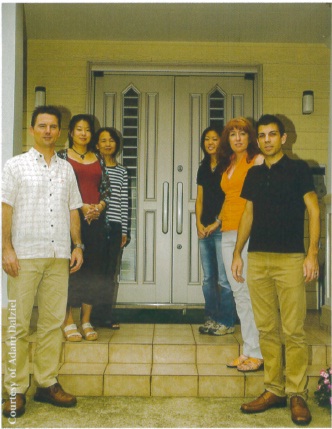by J.M. Roberts
If you have ever found yourself in Tokyo focusing on the pollution, congestion, and anonymity of the world’s largest city, you are not alone. If you have ever felt alienated, alone, or ostracized for the color of your skin or the shape of your features, someone cares. If you have ever let the drab buildings, concreted rivers, or looming shadows of Tokyo’s myriad skyscrapers make you feel insignificant or irrelevant, there is an answer.
TELL Recognized with NPO Status
Tokyo English Life Line (TELL), established in 1973 as Tokyo’s only English-language mental health support network, has recently been awarded official Non Profit Organization (NPO) status by the Japanese government Cabinet office. According to its website, “TELL is the first organization providing comprehensive mental health services to the international community in Japan to receive NPO status…” The benefits go much further than mere recognition according to the chairman of the TELL Board of Directors, Dr. Tsuyoshi Akiyama. “NPO status means TELL is finally a legal entity,” says Akiyama. “This allows for more official interface between the international community and resources available on the Japanese side.”
Brandishing its new official status and legal livelihood and despite its focus on serving Tokyo’s international English-speaking community, TELL will be allowed to operate like any other Japanese non-profit organization. Put simply, NPO status will allow TELL to lobby for previously inaccessible financial resources from the Japanese government. In years past, TELL has always relied upon the significant—if slightly inconsistent—contributions from its distinguished list of corporate, diplomatic, charitable and individual affiliations. Now, it’s a different story. In essence, NPO status gives the once silenced foreign community a recognizable voice on the legislative floors and a hand in the proverbial coffers of Tokyo’s government. Although TELL’s constitution, bylaws, meeting minutes, and financial reports will have to be kept in Japanese and subject to the government’s scrutiny, TELL now has the legal ability to sponsor visas for its highly educated staff, open a much sought after psychopharmaceutical clinic, and propose collaboration of public and private funding for the creation of state-of-the-art mental health facilities.
More to TELL
Although originally created as a telephone-based emotional support for Tokyo’s foreign community, it is important to note that, in addition to free telephone counseling, TELL now offers professional face-to-face counseling and workshops in English and Japanese via the TELL Community Counseling Service. Dr. Akiyama recalls the story of a young Japanese university student. “She was quite capable, she studied abroad and was a good student,” he says. “But then her condition deteriorated. She was my psychiatric patient for a time, but then she left private therapy. However, she continued calling TELL regularly for the next few years. I truly believe that she is alive today because of TELL’s support.”
Put aside the NPO status, the annual number of phone calls, the public and private support, and the increasing recognition, and what remains is the amazing staff of professional and volunteer counselors. Dr. Akiyama also credits TELL with providing him an opportunity to meet remarkable people. “The founding members of TELL who taught and trained me are like my parents. My life can never be told without a story about TELL,” he says with a beaming smile.
As for the future of TELL, the sky is the limit. There is currently a big push underway to secure funding and permission to build the psychopharmaceutical clinic, which would allow TELL to begin prescribing medication in-house. There is also the constant drive to expand cooperation between the organization and the Japanese Government, as much of the psychological/emotional support information available in Tokyo is not conveyed to the international community. One of the most extensive projects TELL faces is in figuring out how to allocate the resources necessary to deal with the influx of non-Japanese workers that will continue to crowd the Tokyo cityscape in the coming years. Perhaps most importantly, the future of TELL will be determined by its ability to create a more stable financially base. Dr. Akiyama points out, “We’re not super established financially, so of course that is the main concern for the future.”
Lending an Ear
Behind a very well-educated and highly trained staff of caring professionals lies an organization built upon a single premise: to be there when someone needs help, to listen, to care, and to help them find their own solutions to their problems. In a word: empowerment. TELL was created to be an ear when all others were deaf and a voice of reason when all others were irrational. Recognizing someone’s ability to make constructive choices about his/her own life, and empowering them to do so illustrates TELL’s unique and refreshing confidence in the strength of the human spirit. According to Dr. Akiyama, the success of this formula lies not in the organization’s mission statement but in its extraordinary staff. “We need people with a hot heart and a cool brain. We need people with both passion and planning. We welcome those who have enthusiastic hearts and cool heads.”
The Life Line
Free, anonymous telephone counseling.
Call 03-5774-0992 daily 9am-11 pm
TELL Community Counseling Service
Professional face-to-face therapy and workshops.
Call 03-3498-0231 (English) or 03-3498-0232 (Japanese)
TELL Business Office: 03-3498-0261
www.telljp.com









